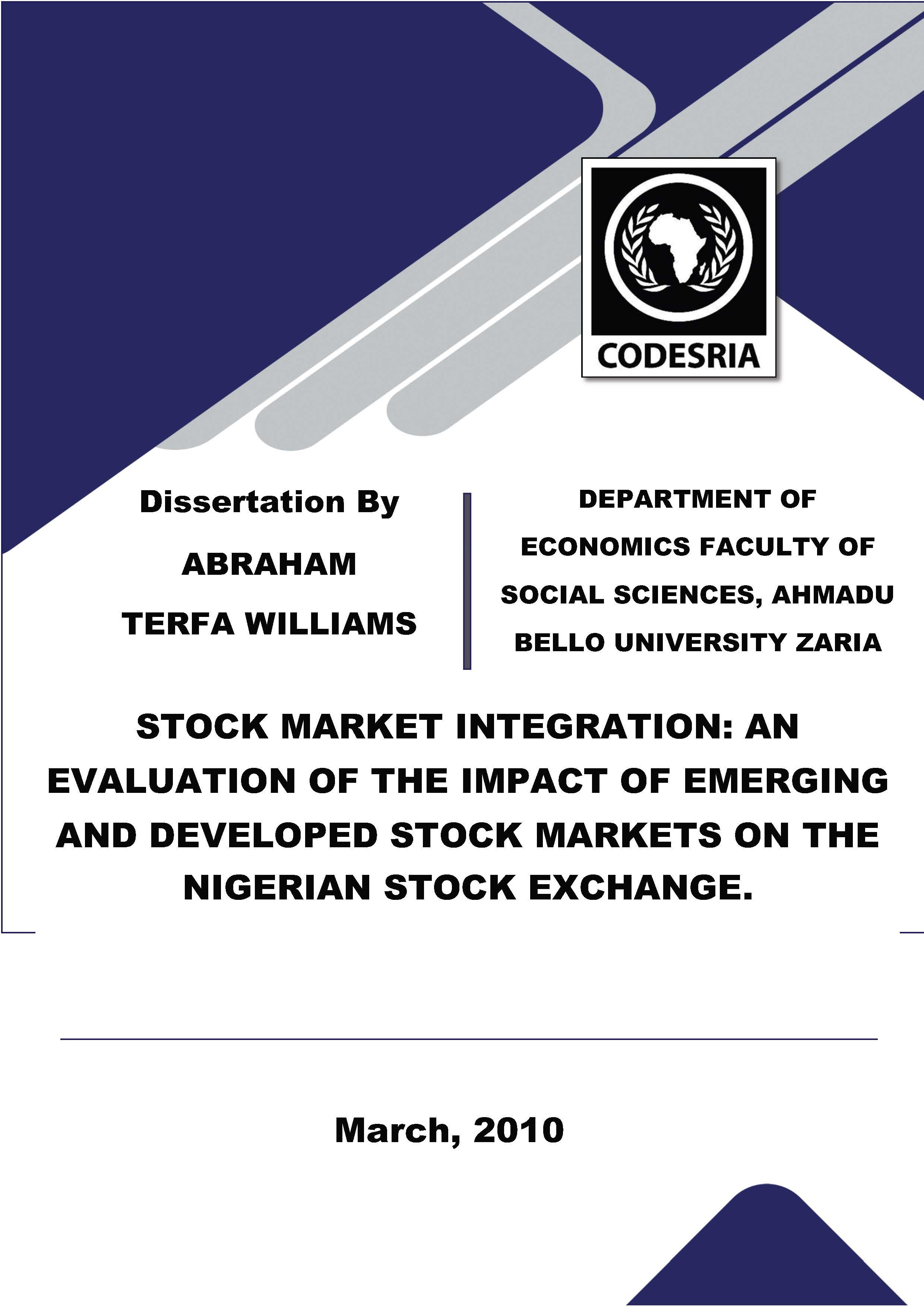STOCK MARKET INTEGRATION: AN EVALUATION OF THE IMPACT OF EMERGING AND DEVELOPED STOCK MARKETS ON THE NIGERIAN STOCK EXCHANGE.
Mots-clés :
Financial market, monetary policy, fiscal policy, petroleum markets, emerging stock markets, Japan, United Kingdom, United States, Egypt, South AfricaSynopsis
Over the past few decades, the world stock markets have surged and emerging markets have accounted for a significant part of the boom (Yartey and Komla, 2007). In Nigeria, following the deregulation of the capital market in 1993, the Federal Government in 1995 internationalized the capital market with the abolition of laws that constrained foreign participation in the Nigerian capital market. There are now no limits to the extent of integration between Nigerian economy and foreign economies. In recent times, Nigeria has also moved towards integrating her stock market with other African and Global exchanges (ANDnetwork, 2006).
In the 1980s, many emerging markets’ opened their stock market to foreign investors. By the 1990s, most of these countries in Asia, Latin America and Russia faced severe financial crises (see Yang et al, 2002 for instance on stock market integration and financial crises: the case of Asia). These events have helped in stimulating a debate about the benefits of stock market integration and more generally the debate about the benefits of globalization (see Stiglitz, 2002).
While the Investment and Securities Act of 1999 Part II, 8(i) and 8(j) provides institutionalize support for market integration in Nigeria (see Appendix (B) for an extract of the Act), the Pensions Act 2004 on the other hand, provides institutional backings for investing Pension Funds in the Stock market (see also Appendix (B) for an extract of the Act). The pension reform Act has the potential of making the stock market to house a huge chunk of the nation’s wealth. The investment and securities Act of 1999 in institutionalizing market integration in may expose the Nigerian capital market to contagion.
Téléchargements
Références
Abrego, L. and Osterholm P. (2008). “External Linkages and Economic growth in Colombia: Insights from A Bayesian VAR model”. IMF working papers February, wp/08/46 JEL classification number: C32, F37, F43
Abraham, Terfa Williams (2008) “An Econometric Investigation of the Fluctuation of Prices on the Nigerian Stock Exchange”. Journal of Marketing Management Ahmadu Bello University Zaria Vol. 2 No. 1
Adam, C and Goderis, B (2006). “Monetary policy and oil price surges in Nigeria”. Centre for the Study of African Economies Department of Economics University of Oxford: A paper prepared for the Central Bank of Nigeria Workshop on Economic Policy Options for a Prosperous Nigeria, Abuja, October 23-24, 2006.
Adeyemi, K.S (1998). “Options for effective development of Nigeria capital market”.
NES papers on the Capital Market and Nigeria’s Economic Development Lagos Page 59-83
Aigbokhan, E (2005). ‘Bilateral Initiatives: Nigeria’s Bilateral Trade Agreements’. In
Nigeria and the Neo-liberal world economic system.(Abubakar Momoh edited) FES,Frankard publishers,lagos Pages 104-192
Allen, F. and S.Morris (2001). “FinanceApplications of Game Theory,” in K.
Chatterjee and W. Samuelson (eds), Advances in Business Applications of Game Theory, Boston: Kluwer Academic Publishers, 17–48.
Allen, Franklin and Gale, Douglas (2007). Understanding Financial Crisis. New York: Oxford University Press.
Ariyo, A & Adelegan, O (2006). ‘Assessing The Impact of Capital Market Reforms in Nigeria: An Incremental Approach’. NES papers on Costs and Benefits of Economic Reforms in Nigeria (Chp 19, page 559 – 595), University of Ibadan-Nigeria.
ANDnetwork, (2006). Nigeria moves towards integration of African stock exchanges., http://www.ise.co.za/
Anyanwu, J.C & Erhijakpor, A.E.O (2008). Assessing Nigeria’s competitiveness In
the African context: A case of the Natural Resource Curse. Paper Submitted for Presentation at the 2008 Annual Conference of the Nigerian Economic Society,Abuja, 26-28 August 2008.
Ashraf, M and Ahmed, K (2003). Sited in Jakob, Vestergaard (2004). ‘The Asian
crisis and the shaping of proper economies’. Camabridge journal of economics 28(6). November. Oxford university press.






